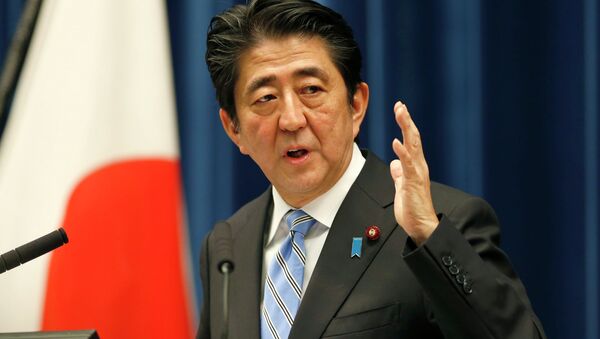MOSCOW, November 18 (Sputnik), Ekaterina Blinova — Japanese Prime Minister Shinzo Abe has officially announced plans to hold early parliamentary elections and postpone a second sales-tax increase in order to overcome the recession.
"The announcement came after preliminary data yesterday showed the world's third-biggest economy contracted 1.6 percent in the third quarter," Bloomberg noted.
The news agency points out that Abe's economic policies (also known as Abenomics) initially proved effective, resulting in an unprecedented rise of Japan's stock indices by 93 percent since mid-November 2012. However, the first phase of the tax increase implemented in April 2014 had led to a 7.3 percent economy reduction in the second quarter.
Trevor Greetham, director of asset allocation at Fidelity Worldwide Investment, stressed that Mr. Abe's decision to postpone the second phase of the sales tax hike was a positive move.
"We have consistently argued this year's sales tax hike was a mistake. We see its delay as good news for the economy and good news for the stock market over the medium term," he said as quoted by the Financial Times.
"As investors we always thought Abenomics was at its most compelling in its early days when the Three Arrows pointed in the same direction. We are back at that stage now. Monetary policy has stepped up a gear with a more aggressive phase of quantitative easing," Trevor Greetham added.
However, Japanese experts express their deep concerns regarding the state's growing debt, claiming that the sales tax increase is the only way to lower it. In response, Mr. Abe has asserted that he would not again postpone the sales tax hike in 2017, adding that Japan "will achieve both economic revival and fiscal reconstruction."
Bloomberg notes that Abe's ruling Liberal Democratic Party (LDP) has over 60 percent of seats in the lower house of Japan's parliament. Early elections may help Abe and LDP retain control over parliament and allow the current Prime Minister to preserve his position until 2018. On the other hand, if LDP loses, the Prime Minister will resign.
"I thought we should test the will of the people," Abe emphasized as quoted by Bloomberg. "If the LDP-Komeito coalition doesn't keep its majority, we cannot push forward the three arrows and Abenomics. If we don't get a majority, it would be a rejection of Abenomics, and I would resign."
Analysts suggest that an economic slowdown "could spell the end of the so-called Abe phenomenon," the New York Times underscores. Abe's high approval ratings were based on the rapid growth of Japan's economy and "his success in lifting some of Japan's economic gloom and in restoring confidence."
"There is only one reason to call an election now, and that is the fear that things will be only worse if he waits. The expectation of political stability and an Abe administration unchallenged for six years, that so many thought just two weeks ago was the most likely scenario, is now history. Suddenly, we have an economy in recession, a government in political trouble and a very cloudy future," said Gerald L. Curtis, an expert on Japanese politics at Columbia University, as quoted by the media outlet.




